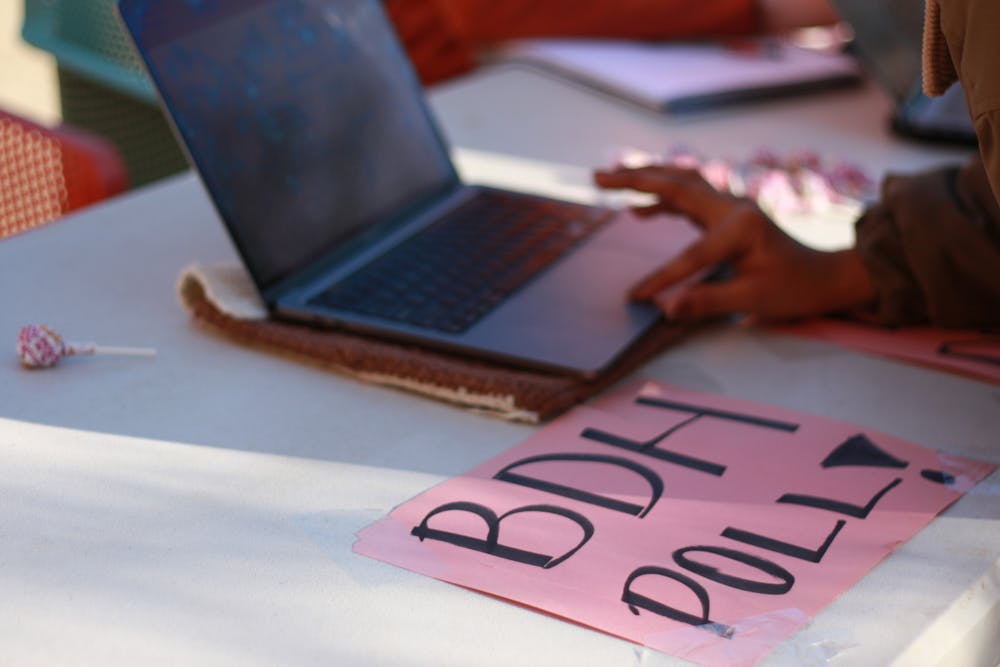Correction: President Christina Paxson P'19 P'MD'20's approval rating is 32.3% among all students, including those who strongly and somewhat approve. 28.2% of all students strongly or somewhat disapprove of the way Paxson handles her job as president, and 39.4% of students have no opinion. Among first-years, 23.7% strongly or somewhat approve of Paxson, while 23% strongly or somewhat disapprove and 54% have no opinion. A previous version of this story misstated Paxson's approval rating by class year. The Herald regrets the error.
Welcome to The Herald’s spring 2023 poll. Between March 7 and 9, Herald staffers polled over 1,000 undergraduate students on a variety of questions ranging from demographics and lifestyle to the approval ratings of campus leaders and policies. Some of its notable findings can be explored below. You can further explore the data on your own using our interactive site.
The Herald conducts a campus-wide poll each semester to identify trends in student opinions and experiences. Our questions are selected by Herald editors, and the data analysis and design is completed with the support of The Herald’s Tech Team. The results of our fall 2022 poll — conducted in collaboration with the Brown Opinion Project — are available here.
In the fall 2022 poll, The Herald and BOP asked students whether they planned to vote in the U.S. midterm elections in November 2022. Among eligible voters, 82.9% said that they planned to vote — but only 52.7% of eligible voters surveyed this semester said that they voted in the midterm elections.
Research from the Center for Information and Research on Civic Learning and Engagement at Tufts University estimated that around 27% of Americans aged 18-29 voted in the 2022 midterm elections, the second-highest turnout for youth voters in nearly 30 years after a turnout of 31% in the 2018 midterm elections.
In this semester’s poll, 61.1% of respondents described their social circle as a friend group, while 38.9% said their social circle consisted of individual friendships. This breakdown did not vary significantly by class year, though The Herald previously reported that the class of 2024 has struggled to find community after arriving on campus in the midst of the COVID-19 pandemic in 2021.
Students on campus often build their networks through clubs, residence halls and shared classes. Student-athletes reported finding a strong community of peers on their teams, whose upperclassmen members help first-years and new recruits adjust to academics and life on College Hill. Dating apps like Bumble — as well as Brown students — have developed new apps designed for users to make friends and grow their social networks.
A Dartmouth study of college students found that the nature of their social circles remained relatively consistent post-graduation. The study also found that students’ race and class greatly influence the structure of their social circles.
Nearly two-thirds of respondents who voted in the 2022 U.S. midterm elections last November said that they believe Brown should consider race in admissions. This was 20% higher than the 46.3% of respondents who did not vote. The future of race-conscious admissions in the United States — also known as affirmative action — is in jeopardy as the Supreme Court is expected to rule against the practice in two cases against Harvard and the University of North Carolina.
The University has a long history of student activism — and more recently, legal support — for race-conscious admissions. In 2007, a Herald poll found that 53% of students supported race conscious admissions policies. The administration has filed amicus briefs along with other universities in support of protecting race-conscious admissions policies.
The end of affirmative action would have significant implications on admissions at universities: Harvard presented data in its court arguments showing that ending affirmative action would result in a significant decrease in matriculation of students from historically underrepresented racial backgrounds. The University is actively preparing for the potential overturn of race-conscious admissions policies this summer, Associate Provost for Enrollment Logan Powell has said on multiple occasions this spring.
This semester’s poll showed that first-year students were more likely to have neither positive nor negative feelings about President Christina Paxson P’19 P’MD’20. Seniors were more likely to approve of Paxson's performance, with 41% reporting somewhat or strong approval.
With a resurgence of on-campus activism in recent semesters, many groups have launched campaigns that demand the University revise its gift acceptance policies and cut its remaining ties with the fossil fuel industry. In 2020, the University’s Advisory Committee on Corporate Responsibility in Investment Policies recommended that the University divest its endowment from “any company that profits from the Israeli occupation of Palestinian land,” a call around which student activist groups have recently resumed activism.
Paxson recently told a conference that she rejects calls to use the endowment as “a tool for political advocacy.”
Around 80% of respondents who do not receive any financial aid reported that they sleep seven or more hours on average. 77.3% of respondents who receive grants covering some costs similarly reported that they get seven or more hours of sleep a night on average. But only 67% of respondents who receive full financial assistance reported getting that amount of sleep on average — more respondents in this category said they sleep five or six hours on average.
Studies have shown that financial stress can be correlated with insufficient sleep and can have significant impacts on college students’ wellbeing and academic performance.
The percentage of seniors who sleep more than seven hours is higher than that of any other class year. Around 70% of first-years reported sleeping seven or more hours, while 79.2% and 78.5% of sophomores and juniors reported sleeping the same amount, respectively. 83.7% of senior respondents reported sleeping seven or more hours on average, more than any other class year.
Our analysis also found trends in sleep habits that varied depending on if respondents self-identified as varsity athletes and first-generation college students. To explore these cross-tabulations and many more, you can visit our interactive tool.
Charlie Clynes was the managing editor of digital content on The Herald's 134th Editorial Board. Previously, he covered University Hall and the Graduate Labor Organization as a University News editor.

Sam Levine is a University News editor from Brooklyn, New York covering on-campus activism. He is a senior concentrating in International and Public Affairs.

Rhea Rasquinha is a Metro editor covering development and infrastructure. She also serves as the co-chief of illustrations. She previously covered College Hill, Fox Point and the Jewelry District. Rhea is a senior from New York studying Biomedical Engineering.





